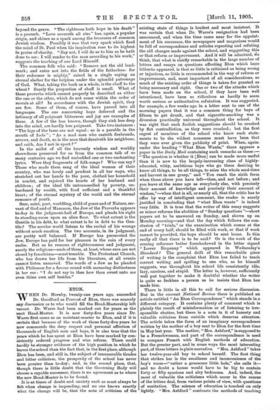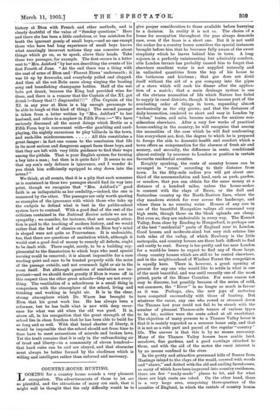It is at times of doubt and anxiety such as
must always be felt when change is impending, and no one knows exactly what the change will be, that the note of criticism of the
existing state of things is loudest and most insistent. It was certain that when Dr. Warre's resignation had been announced, and when the time came near for the appoint- ment of his successor, the newspapers and magazines would be full of correspondence and articles repeating and refuting the old charges made against the school, and suggesting this or that reform or improvement. And it will be admitted, we think, that what is chiefly remarkable in the large number of letters and essays on questions affecting Eton which haye hitherto appeared, is that so little is criticised as being wrong or injurious, so little is recommended in the way of reform or improvement, and, most important of all considerations, so much of the existing order of things is taken for granted as being necessary and ‘right. One or two of the attacks which have been made on the school, if they have been well intentioned, have been so ridiculous as hardly to seem worth serious or authoritative refutation. It was suggested, for example, a few weeks ago in a letter sent to one of the morning papers that it was a common thing for boys of fifteen to get drunk, and that cigarette-smoking was a diversion practically universal throughout the school. It was right that such foolish suggestions should be crushed by flat contradiction, as they were crushed; but the first regret of members of the school who know such state- ments to be the wildest nonsense must have been that they were ever given the publicity of print. When, again, under the heading " What Eton Wants," there appears a paper in the Daily Mail containing such remarks as these :- " The question is whether it [Eton] can be made more usefuL than it is now to the largely-increasing class of highly- educated, witty, ambitious boys who go there desiring to know all things, to be all things, to seize the whole seed-time and harvest in one grasp," and "You reach the sixth form when those above you have left—then, and not before ; and you leave at the same age as everybody else, with precisely their amount of knowledge and precisely their amount of wisdom,"—when that is all, or nearly all, that the critic has to offer by way of intelligent comment, the reader is surely justified in concluding that " what Eton wants " is indeed very little. It is true that the writer of this essay suggests as minor reforms the abolition of " Sunday questions "—short papers set to be answered on Sunday, and shown up on Monday morning—and that the day which follows the con- clusion of "trials," or the examination which comes at the end of every half, should be filled with work, or that if work cannot be provided, the boys should be sent home. Is this really all that there is to be said P Or is the work of the coming reformer better foreshadowed in the letter signed ," Lower Sixpenny " which appeared in Wednesday's Standard? The general drift of this remarkable piece of writing is the complaint that Eton has failed to teach correct writing and spelling to one who, as he himself suggests, was throughout his school life consistently idle, lazy, careless, and stupid. The letter is, however, sufficiently well put together to make it doubtful whether the writer is quite so feckless a person as he insists that Eton has made him.
There is little in all this to call for serious discussion. But in the current National Review there is published an article entitled "An Eton Correspondence" which stands in a different category. It contains plenty of comment which is plainly the result of misinformation or of listening to irre- sponsible chatter, but there is a note in it of honesty and valuable criticism from outside which deserves attention. The article takes the form of an imaginary correspondence written by the mother of a boy sent to Eton for the first time in May last year. The mother, " Mrs. Ashford," is supposed to be a Frenchwoman, and part of the correspondence is used to compare French with English methods of education. But the greater part, and in some ways the most interesting part, of these letters is plain narrative. "Mrs. Ashford" takes her twelve-year-old boy to school herself. The first thing that strikes her is the smallness and inconvenience of the !boy's room—" rather a gruesome little hole," she calls it— 'and no doubt a house would have to be big to contain forty or fifty spacious and airy bedrooms. And, indeed, the most of valuable the criticisms which occur in' the course of the letters deal, from various points of view, with questions of sanitation. The science of education is touched' on only lightly.' "Mrs. Ashford " contrasts the methods of teaching history at Eton with French and other methods, and is clearly doubtful of the value of " Sunday questions." Here and there she has been a little credulous, or has mistaken for truth the ignorant gossip of small boys,—and no one except those who have had long experience of small boys knows what amazingly incorrect notions they can conceive about things which go on, so to speak, above their heads. Take these two passages, for example. The first occurs in a letter Bent to " Mrs. Ashford " by her son describing the events of his first Fourth of June. "At the end there was a thing with the coat of arms of Eton and Floreat Etona ' underneath ; it was lit up by fireworks, and everybody yelled and clapped. And then all the wet Bobs came along singing the boating song and brandishing champagne bottles. Half of the wet bobs got drunk, because the King had provided wine for them, and there is a rumour that the Captain of the XI. got drunk !—fancy that !! disgraceful! ! !" (The Captain of the XI. in any year at Eton is a big enough personage to be able to laugh at this kind of thing.) The second passage is taken from a letter written by "Mrs. Ashford" to her husband, and refers to a nephew in Fifth Form :—" We have seriously discussed all the secret doings which Bertie as a Fifth Form boy is conversant with—the gambling and card- playing, the nightly excursions to play billiards in the town, and such-like misdemeanours All this constitutes a great danger : in fact one comes to the conclusion that life in its most serious and dangerous aspect faces these boys, and that they are left with very little guidance to find their ways among the pitfalls. That is your English system for turning a boy into a man; but then is it quite fair? It seems to me that my son's only defence is ignorance, and I wonder do you think him sufficiently equipped to step down into the arena? "
We think, at all events, that it is a pity that such nonsense as is contained in these two passages should find its way into print, though we recognise that "Mrs. Ashford's" good faith is• as indisputable as her credulity, indeed, the one is measured by the other. The passages are only worth quoting as examples of the ignorance with which those who take up the cudgels to defend what is best in the public-school system have to contend. With a good deal of the rest of the criticism contained in the National Review article we are in sympathy; we consider, for instance, that not enough atten- tion is paid to the teaching of modern history, and we would rather that the bed of classics on which an Eton boy's mind is shaped were not quite so Procrustean. It is undeniable, too, that there are questions of sanitation which, although it would cost a good deal of money to remedy all defects, ought to be dealt with. There ought, surely, to be a building sup- plemental to the Sanatorium to which boys who need special nursing could be removed; it is almost impossible for a case needing quiet and care to be treated properly with the noise of the passage outside, and not overmuch light or air in the room itself. But although questions of sanitation are im- portant—and we should doubt greatly if Eton is worse off in this respect than the other great schools—they are not every- thing. The ventilation of a schoolroom is a small thing in comparison with the atmosphere of the school, living and thinking and working in bright air. It is in the clear, strong atmosphere which Dr. Warre has brought to Eton that his great work lies. He has always been a reformer, but he has built what is new with deep rever- ence for what was old when the old was good. It is, above all, in his recognition that the great strength of the school lies in clean freedom that he has been able to build for so long and so well. With that broad charter of liberty, it would be impossible that the school should not from time to time have to meet accusations of misrule and broken laws. Yet the truth remains that it is only in the enfranchising air of trust and liberty—in a community of eleven hundred— that hard rules can be and are obeyed, and that character must always be better formed by the obedience which is willing and intelligent rather than enforced and necessary.











































 Previous page
Previous page